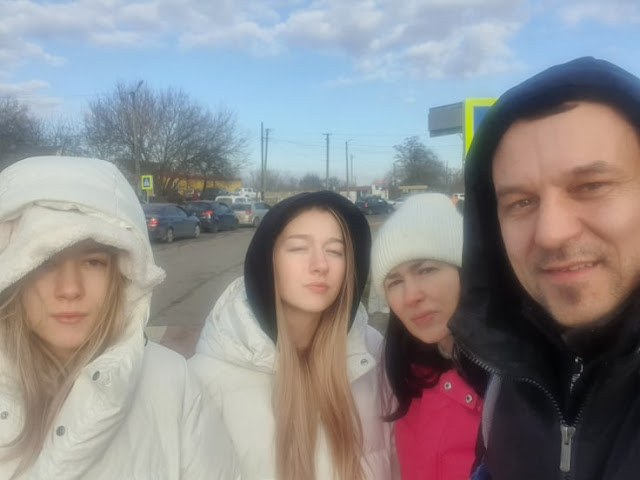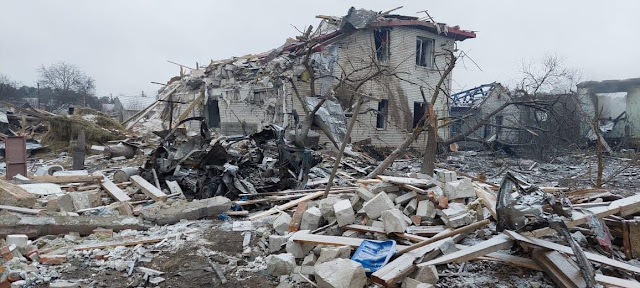I have been asked by several people to provide an update regarding my friend Alex who I wrote about several days ago. Alex took his wife and daughters to the Polish border last Saturday (Feb 26). The wife and daughters went to Łódź, Poland, while Alex then returned to Zhytomyr, Ukraine. Since then, I’ve talked to them numerous times and I’d just like to provide an update.
Alex’s wife and daughters returned to Alex’s brother’s house in Łódź, Poland (I’m not going to use anyone’s name except Alex’s in order to protect their privacy). There are a large number of Ukrainian refugees in Łódź and Alex’s wife is networking with them. She’s a clinical psychologist so, as time allows, she’s using her skills to counsel some of these refugees. As we can imagine, there’s a very high level of stress and anxiety among these folks. They’ve suddenly been displaced to a foreign land, and they have no idea what the future holds. Alex’s wife is cheerfully putting her talents to work to help them.
She’s also helping to evacuate more people from Zhytomyr into Poland. Yesterday she spent a great deal of time trying to find ways to evacuate an elderly couple from Zhytomyr.
The Polish government is providing a certain amount of support to these refugees. The wife and daughters went to the store yesterday to buy a few clothing items. They were forced to leave Ukraine with literally nothing but the clothes on their backs. While they were going to a relative’s house, they’re still struggling to gather all the supplies they’ll need.
Alex’s wife is acutely aware of the destruction that’s going on back in Ukraine. She mentions that it’s very quiet and peaceful in Łódź and she feels a little guilty that she’s in such an environment when Alex is back in Ukraine right in the middle of the danger.
Alex is back in Zhytomyr and he’s pretty busy right now. He wrote me yesterday saying that he’s very busy making sandbags and then stacking the sandbags into walls and other defensive-type structures. He’s been surprised at how quickly he learned how to do this efficiently. A sandbag wall has to be built just so, with holes at just the right height so a rifle can have a place to shoot through. He’s quickly become proficient with this. Alex has joked that he’s stunned how fast a truckload of sand can be emptied into sandbags when the situation is so desperate!
Crews of Zhytomyr men are going through the city making sandbag defenses in this way. They are already accustomed to the sound of the air raid sirens and don’t let them slow their work. Alex, as well as the other men, have learned that it is absolutely critical to complete this work with a smile! They have to do everything they can to keep their spirits up, otherwise they will crumble. The camaraderie that is growing among these men is incredible and strong bonds are being forged.
They are well aware that the outskirts of Kyiv are only 70 miles to the east. Of course, Kyiv is one of the locations that the Russians are heavily targeting, and the city is slowly being encircled. 2 days ago, on the east edge of Zhytomyr on the road to Kyiv, a bridge was blown up. The Ukrainians were at that point still in control of this highway but I don’t know what the situation is by now.
Supplies on the shelves at the stores are dwindling; bread is already all gone. Fuel and diesel are all gone. Some people had been stockpiling food because they suspected this was coming. For now, Alex is OK as far as food goes.
Last night, (for us in USA the night, in Ukraine it was daytime on Wednesday, 2 March) missiles hit an area on the east side of Zhytomyr. We don’t know exactly what the missiles were targeting but extensive damage was done to a hospital. I don’t know exactly what to call it – it’s not a hospital exactly, it’s a birth center – a facility that just provides care and services for birthing mothers. The missiles were perhaps targeting an area across the street from this facility, but everything’s gone now. Early estimates are that 2 are dead and 16 wounded. Among these casualties are several children.
Each minute, Alex’s situation becomes more precarious. The Russian army continues to advance and even though the Ukrainians are putting up a heroic stand, they are severely underpowered. Please contact your congressional representatives right now and put pressure on them. Please consider donating to a reputable charity like the MCC, Catholic Charities, or Heart to Heart International. Also, please see this list of charities for more options.







